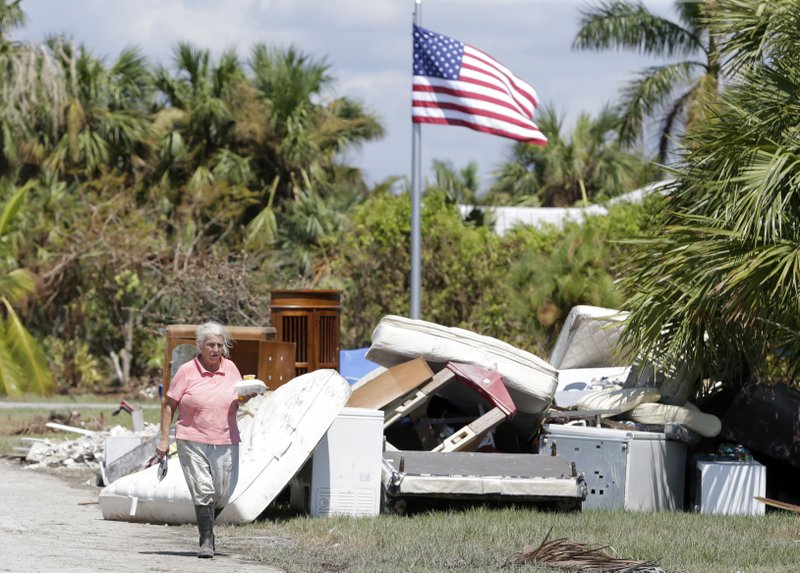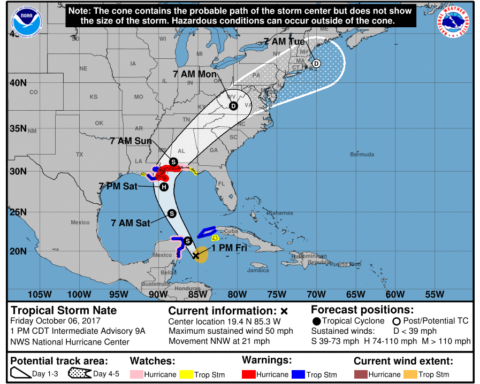Dealing with wrecked belongings and reports of toxic muck, residents of a tiny town where Florida’s Everglades meet the Gulf of Mexico cleared their homes Monday in scorching 92 F (33 C) heat with no air conditioning and no electricity except from a few generators.
The isolated Everglades City community of about 400 people suffered some of Florida’s worst storm surges — up to 9 feet (2.7 meters) — when Hurricane Irma slammed the region eight days ago, leaving the insides of homes a sodden mess and caking the streets with mud. The storm affected nearly every part of the state, and more than two dozen people were killed.
“We will make it. We just have to stay positive,” said Shaun Foerman, who was ripping drywall and carpeting from his home, which sits on 2-foot stilts but still was filled with 4 feet of water.
The post-storm death of a man in the nearby hamlet of Ochopee from an infected wound after walking through mud alarmed residents and prompted Florida’s Health Department to tweet Sunday that rumors of spreading flesh-eating bacteria were false. Collier County said authorities were testing stormwater, and state health officials have offered vaccinations while investigating reports of infections.
The state’s emergency management division reported Monday that more than 407,000 homes and businesses were still without electricity — nearly 4 percent of all utility accounts in the state.
Nearly 30 percent of homes and businesses in both Collier and Monroe counties remain without power. Florida Power & Light, the state’s largest utility, said it will take until Friday to restore electricity to most homes in southwest Florida.
Several Everglades City residents said they needed generators and complained that the Federal Emergency Management Agency had not done much yet, beyond taking applications for aid. Help arrived faster after Hurricane Wilma in 2005, said Robert Miller, who added that his restaurant, store and real estate company in town have suffered $3.5 million in damages from Irma.
“This is ridiculous,” Miller said, pointing to the piles of ruined mattresses, furniture, clothes and tree branches piled along his street. “Find me a truck in this town. There aren’t any. Last time, FEMA agents were in here. They were getting us loans. They brought trailers in. We have people here who don’t have a place to live.”
FEMA said the agency has supplied Florida with 73 generators, among other aid, but it’s up to state officials to distribute them. Regional administrator Gracia Szchech denied that the agency’s response in Everglades City or elsewhere has been slower than after Wilma. She said the agency’s job was not to provide cleanup trucks but to reimburse the state for its work and to help individuals with houses.
“We are going to come up with solutions, working with the state to come up with various housing solutions for survivors throughout the state of Florida. There is a process to it,” Szchech said at a news conference in Naples.
Gov. Rick Scott urged counties and residents to focus now on debris cleanup, getting power back and helping individuals who have lost homes. He said he has ordered each county to submit a cleanup plan to the state by noon Tuesday.
In Foerman’s home, a water-logged piano sat in what used to be the living room. Outside, the family’s leather-bound Bible was set to dry on the porch in hopes of saving it. On a wall, an acoustic guitar owned by Foerman’s father was hanging to air out. Foerman’s mother found it floating in its case after the storm. When she picked up the case, sheet music for the song, “Angels Watching Over Me” fell out, he said.
“That was pretty deep. She just about lost it,” said Foerman, a 40-year-old contractor whose family has lived in the community for 80 years.
Volunteer Michael Hunter said he has no electricity at home in Naples, but residents of Everglades City were in much worse shape.
“It’s hotter than heck, but we have four walls,” said Hunter, a medical supplies salesman. “These people don’t have anything. They don’t have water, they don’t have food. It shows what’s important in life.”
In Ochopee, home to the country’s smallest post office, Lisa Marteeny grieved over the death of her 72-year-old husband, Lee, who succumbed Saturday to a leg infection he contracted while walking through the water and muck after the storm.
The couple thought they could ride out the storm in their waterfront mobile home as they had done with Wilma. But when the water started rising, reaching their chests in less than an hour, they and their dog, Killer, had retreated to the 12-foot balcony on their neighbor’s home and spent the night.
Late last week, Lee Marteeny’s leg began aching and some red spots turned black.
“He woke up Friday morning in such agony,” Lisa Marteeny said, weeping. “I said to him, ’Honey, what we are doing isn’t working,” and she urged him to go at hospital, where he was put on a ventilator. “He never woke back up.”
Republished with permission of The Associated Press.







